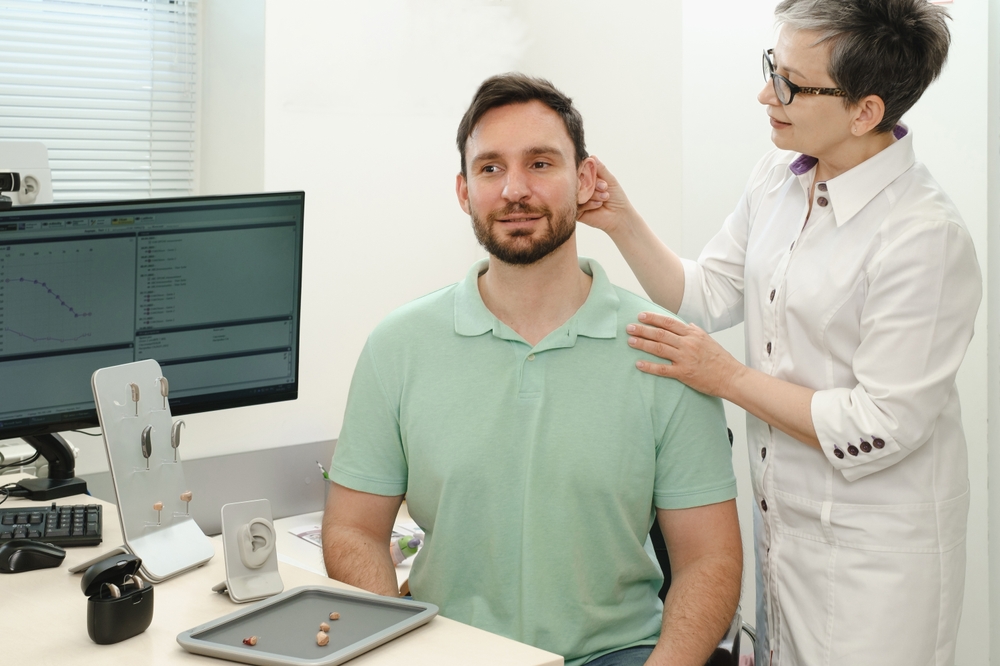
Identifying the subtle signs of adult hearing loss is crucial for early detection and support, as this can significantly improve quality of life. Mishearing words, difficulties in noisy environments, increasing the volume on devices, withdrawing from social settings, and struggling with phone conversations are common indicators. Recognizing these subtle signscan lead to improved communication, mental well-being, and stronger relationships. Addressing these early can make a significant difference in managing and mitigating the effects of adult hearing loss.
Common Misheard Words
One of the earliest signs of adult hearing loss is the frequent misinterpretation or mishearing of words during conversations. This issue often manifests in everyday situations, such as misunderstood lyrics in songs or miscommunications in the workplace. Research shows that over 48 million Americans have some degree of hearing loss, and many experience these challenges daily.
Mishearing lyrics can diminish the enjoyment of music and reduce the shared cultural experiences that music offers. In professional settings, misheard words can lead to misunderstandings and mistakes, potentially affecting productivity and teamwork. Being aware of these early indicators allows for timely intervention, which can help minimize the impact of hearing loss on daily interactions.
Difficulty in Noisy Environments
Navigating through noisy environments can be particularly challenging for individuals with hearing loss, significantly affecting their ability to communicate effectively. Approximately 26 million adults in the United States experience hearing difficulties in noisy settings. This challenge can create barriers in both personal and professional life, making it difficult to engage in social activities or follow conversations in group settings. Here are some key strategies to support those with hearing loss in noisy environments:
- Workplace Accommodations: Implementing adjustments like noise-canceling headphones or providing preferential seating can help reduce the strain of background noise.
- Lip Reading Support: Encouraging clear speech and facing the individual directly can improve their ability to lip-read and understand conversations.
- Visual Aids: Incorporating hand gestures or writing down key points can aid comprehension.
- Quieter Spaces: Creating designated quiet areas in social or work settings can provide relief from noise.
- Patience and Empathy: Being patient and empathetic when communicating with individuals who have hearing loss can enhance their experience and reduce frustration.
Increased Volume on Devices
Consistently increasing the volume on electronic devices is a subtle but significant sign of potential hearing loss. When individuals find themselves turning up the volume on TVs, phones, or radios, it may indicate difficulty hearing at normal levels. Statistics show that over 30% of adults aged 50-59 have hearing loss, which often leads to higher device volumes. This behavior not only suggests the presence of hearing issues but can also contribute to further hearing damage if left unaddressed.
Listening to devices at high volumes can cause sound sensitivity and even damage to the hearing system over time. To prevent this, individuals should consider using hearing protection and consult a hearing professional to adjust their device settings or seek appropriate hearing aids. Recognizing the need for increased volume can prompt timely evaluation and intervention, helping to maintain better hearing health and quality of life.
Withdrawal From Social Settings
Adults with hearing loss may gradually withdraw from social settings, feeling overwhelmed or embarrassed by their inability to follow conversations. This withdrawal is a significant sign of hearing loss, often leading to social isolation and impacting mental health. Research indicates that individuals with untreated hearing loss are up to five times more likely to experience social isolation.
- Social Isolation: Difficulty in hearing can lead to reduced participation in social activities, causing feelings of loneliness and disconnection.
- Depression: The frustration and embarrassment of not being able to hear properly can contribute to depression and anxiety.
- Communication Barriers: Hearing loss creates obstacles in conversations, making social interactions stressful and less enjoyable.
- Embarrassment: Asking people to repeat themselves or misunderstanding conversations can cause embarrassment, prompting individuals to avoid social gatherings.
- Impact on Relationships: Withdrawal from social interactions can strain relationships, leading to further feelings of isolation and sadness.
Addressing these signs early and providing support can help individuals with hearing loss feel more included and reduce the risk of social isolation.
Struggling With Phone Conversations
Phone conversations can be particularly challenging for those with hearing loss, as they rely heavily on auditory input without visual cues. This difficulty can lead to frustration and avoidance of phone communication, contributing to social isolation. Studies show that nearly 60% of adults over 65 struggle with hearing on the phone, which can impede both personal and professional interactions.
Hearing aids can significantly improve the ability to hear and understand phone conversations by amplifying sound and reducing background noise. Despite this, the absence of visual cues still poses a challenge. Alternative communication methods, such as text messaging, video calls, and captioned phone services, can provide more accessible options. These methods can help maintain meaningful communication, reducing the isolation often experienced by individuals with hearing loss.
Don’t miss out on the opportunity to improve your hearing and quality of life. Contact El Dorado Hearing today to schedule a consultation and take the first step towards better hearing.



Leave a Reply